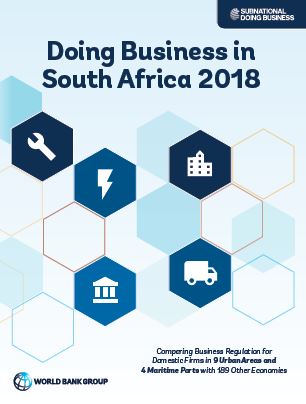Overview
Doing Business in South Africa 2018—the second subnational Doing Business study for South Africa—assesses the regulatory environment for small and medium-size enterprises in the country. It measures the same nine urban areas (Buffalo City, Cape Town, Ekurhuleni, eThekwini, Mangaung, Msunduzi, Nelson Mandela Bay and Tshwane) and four maritime ports (Cape Town, Durban, Ngqura and Port Elizabeth) covered in the 2015 study. The study updates the data for the urban locations across four areas: dealing with construction permits, getting electricity, registering property and enforcing contracts. It also measures the four maritime ports in the area of trading across borders.
Where is it easiest to do business in South Africa?
- Cape Town leads on dealing with construction permits and getting electricity; Mangaung leads on registering property and enforcing contracts. However, none of the nine urban areas performs equally well across all indicators. That leaves room for all locations to learn from each other’s good practices.
- South African locations’ performance varies widely within each area measured. With some South African locations performing on par with OECD high-income economies and others lagging among the bottom 20% globally, there is a need to share and replicate local good practices. This will not only improve individual locations’ performance but will make the whole of South Africa more globally competitive.
- Compared globally, South African locations’ performance on the quality indices lags on most indicators. Because regulatory quality depends greatly on national instruments and actors, the central government can play a key role in improving local business conditions.
- Over the past three years, five locations implemented reforms making it easier to do business. Most reforms focused on getting electricity, with one related to registering property. The pace of reforms has been slow, but the successful reforms are notable for their significant impact.
- Good practices can be found in South Africa. As locations continue to engage in peer learning and take on new regulatory reforms, projects that address certain issues across indicators—such as internal coordination within the municipalities—will improve the prospect that reforms will bear fruit.
See trading across borders details on 4 maritime ports in South Africa.

